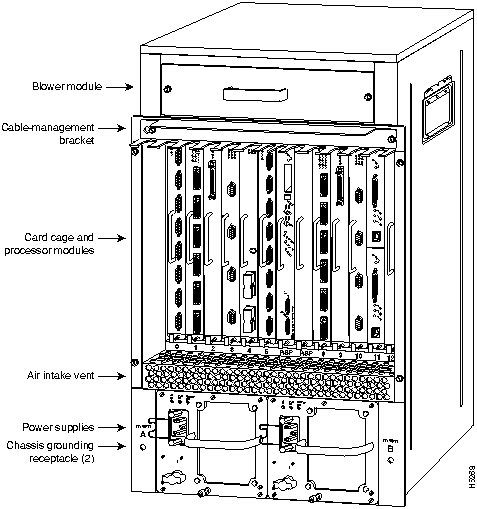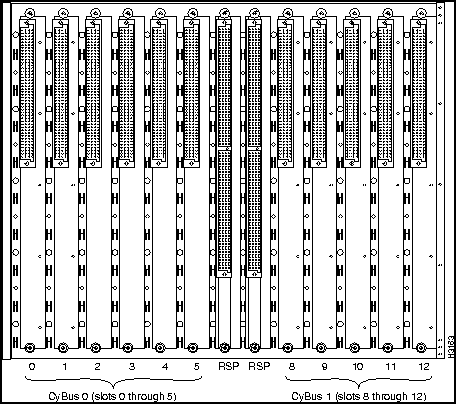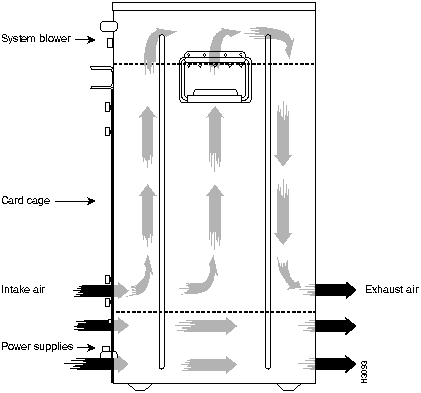|
|
The Cisco 7513 router is part of the Cisco 7500 series.The 13-slot Cisco 7513 router supports multiprotocol, multimedia routing and bridging with a wide variety of protocols and any combination of Asynchronous Transfer Mode (ATM), Ethernet, Fast Ethernet, Token Ring, Fiber Distributed Data Interface (FDDI), serial, High-Speed Serial Interface (HSSI), channel attachment, and multichannel media.
Network interfaces reside on interface processors that provide a direct connection between the two Cisco Extended Buses (CyBuses) and your external networks. The Cisco 7513 has thirteen slots: interface processor slots 0 through 5, Route Switch Processor (RSP2) slots 6 and 7, and interface processor slots 8 through 12.
There are bays for up to two AC-input or DC-input power supplies. The chassis will operate with one power supply. While a second power supply is not required, it allows load sharing and increased system availability.
![]()
Following is a list of acronyms that identify the system components and features:
Figure 1-1 shows a view of the interface-processor end of the Cisco 7513 with AC-input power supplies installed.
Figure 1-1 Cisco 7513, Rear View

The dual-CyBus backplane has 13 slots: six interface processor slots, 0 through 5 (CyBus 0), five interface processor slots, 8 through 12 (CyBus 1), and two RSP slots (6 and 7), as shown in Figure 1-2.
Figure 1-2 Cisco 7513 Dual CyBus Backplane

Table 1-1 lists the specifications for the Cisco 7513 system.
Table 1-1 Cisco 7513 Specifications
| Description | Specification |
|---|---|
| Backplane | Two 1.0677-Gbps CyBuses: 11 interface processor slots, two RSP slots |
| Dimensions (H x W x D) | 33.75 x 17.5 x 22" (85.73 x 44.45 x 55.88 cm)Chassis width including rack-mount flanges is 18.93" (48.1 cm)Chassis depth including power cables and cable management bracket is 24" (60.96 cm) |
| Weight | Chassis with blower module: 75 lbs (34.02 kg)Chassis with blower module and one power supply: 100 lbs (45.36 kg)Chassis with blower module and two power supplies: 125 lbs (56.7 kg)Chassis with blower module, two power supplies, and all slots filled: ~160 lbs (72.58 kg), each processor module weighs ~2.5 lbs (1.13 kg) |
| Power dissipation | 1600W with a maximum configuration and one AC-input power supply1600W with a maximum configuration and one DC-input power supply1700W nominal with a maximum configuration and either two AC-input or two DC-input power supplies |
| Heat dissipation | 1600W (5461 Btu/hr) |
| AC-input voltage | 100 to 240 VAC |
| Frequency | 50/60 Hz |
| AC-input cable | 12 AWG (American Wire Gauge), with three leads and an IEC-320 plug on the router end and a country-dependent plug on the power source end |
| AC-input voltage and current | 100 VAC(1) at 16 amps (A) maximum, wide input with power factor correction (PFC)240 VAC at 7 A maximum |
| DC-input voltage and current | --48 VDC(2) nominal, at 35 amps (A) in North America (--60 VDC at 35A in the E.C.) |
| DC-input cable | 8 AWG (American Wire Gauge, recommended minimum), with three leads and rated for at least 194°F (90°C) |
| DC voltages supplied and maximum, steady-state current (AC- and DC-input) | +5.2 VDC @ 75 A+12 VDC @ 15A--12 VDC @ 3A+24 VDC @ 5A |
| Air flow/noise level | Bottom to top through chassis by variable-speed blower (62 to 70 dBA) |
| Temperature | 32 to 104°F (0 to 40°C), operating; --4 to 149°F (--20 to 65°C), nonoperating |
| Relative humidity | 10 to 90%, noncondensing |
| Software requirement | Cisco IOS Release 10.3(571) or later for the RSP2 and Cisco 7513 |
| Agency approvals | Safety: UL 1950, CSA 22.2-950, EN60950, EN41003, TS001, AS/NZS 3260EMI: FCC Class A, EN60555-2, EN55022 Class B, VDE 0878 Part 3, 30 Class BImmunity: EN55101/2 (ESD), EN55101/3 (RFI), EN55101/4 (Burst), EN55101/5 (Surge), EN55101/6 (Conducted), IEC77B (AC Disturbance) |
The blower on the Cisco 7513 provides cooling air for the processor modules. The blower pulls air into the chassis and up through the card cage, as shown in Figure 1-3.

The exhaust air is forced out the front of the chassis behind the card cage. The power supplies have their own fans whose airflow is independent of the chassis airflow. Ensure that there is minimum front and back clearance of six inches.
For complete information on the blower, airflow, and environmental considerations, refer to the Cisco 7513 Hardware Installation and Maintenance publication, which is available on Cisco Connection Documentation CD-ROM or as a printed copy.
|
|
Copyright 1988-1996 © Cisco Systems Inc.